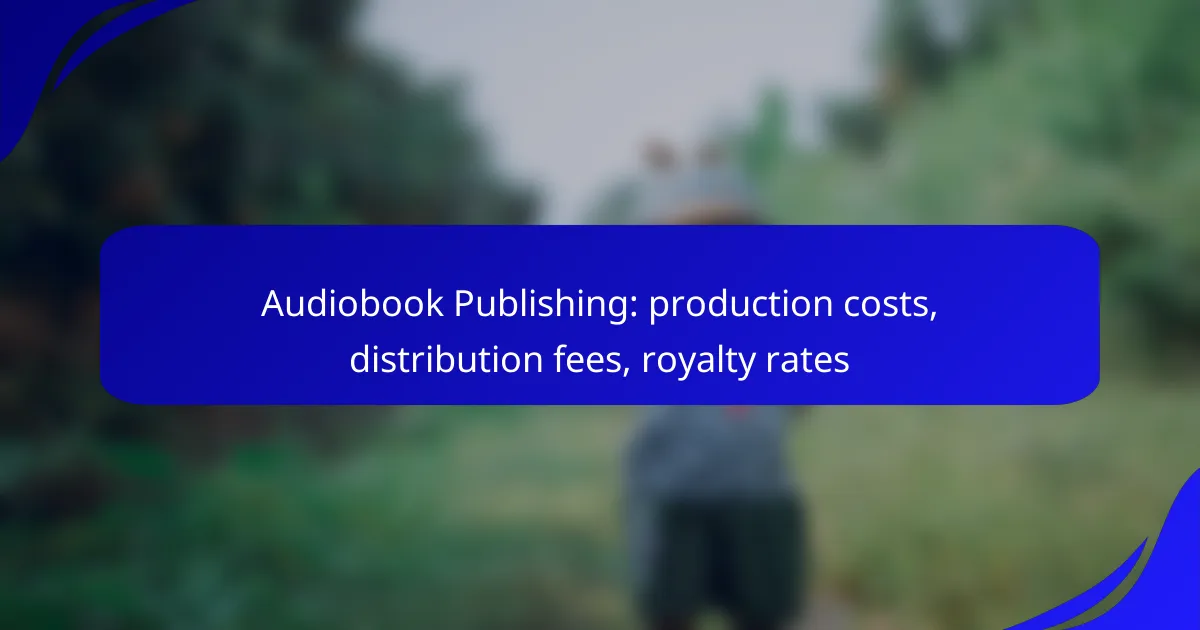Audiobook publishing involves various financial considerations, including production costs, distribution fees, and royalty rates. In the UK, production costs can range from a few hundred to several thousand pounds, influenced by factors such as length and quality. Distribution fees vary by platform and can affect profitability, while authors typically earn royalties between 25% to 40% of the sales price, making it essential for them to understand these dynamics to maximize their earnings.
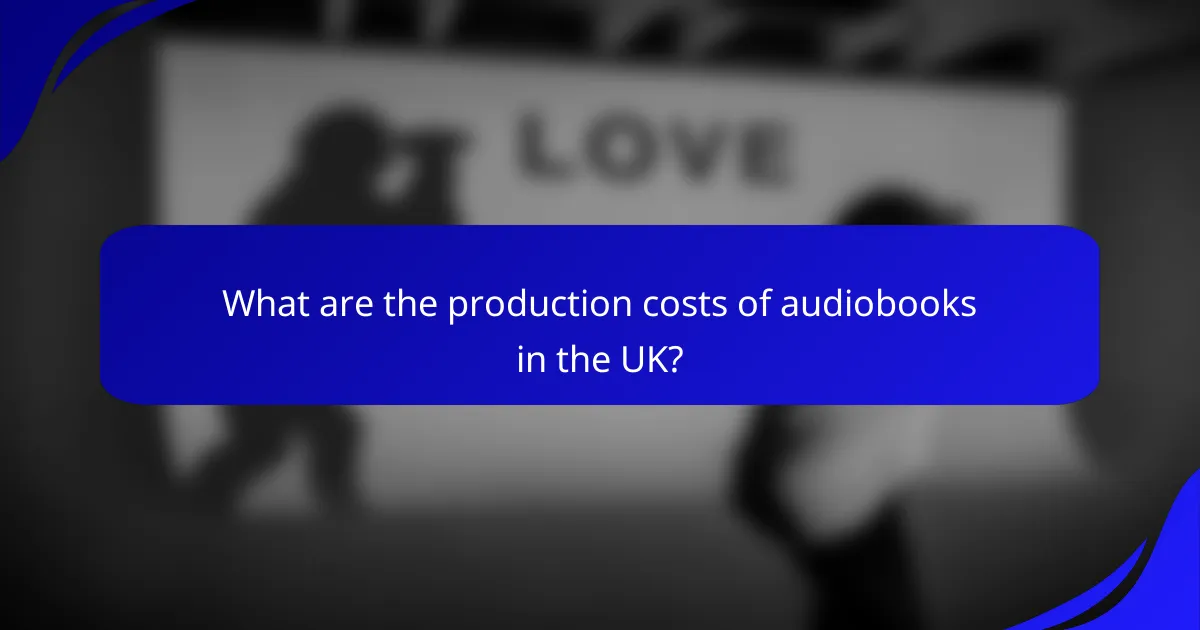
What are the production costs of audiobooks in the UK?
The production costs of audiobooks in the UK can vary significantly based on several factors, including the length of the audiobook, the quality of production, and the talent involved. Generally, these costs can range from a few hundred to several thousand pounds, depending on the specific requirements of the project.
Studio recording expenses
Studio recording expenses typically include the cost of renting a professional recording space, which can range from £30 to £150 per hour. The total cost will depend on the length of the audiobook and the studio’s reputation. It’s advisable to book a studio that specializes in audiobook production to ensure high-quality sound.
Voice talent fees
Voice talent fees can vary widely based on the experience and popularity of the narrator. Rates for professional narrators in the UK often range from £150 to £400 per finished hour of audio. It’s important to choose a voice that fits the tone of the content, as this can significantly impact listener engagement.
Post-production costs
Post-production costs involve editing, sound design, and mastering, which are crucial for a polished final product. These services can add an additional £100 to £500 to the overall budget, depending on the complexity of the audio and the expertise of the audio engineer. Investing in quality post-production can enhance the listening experience and reduce the likelihood of negative reviews.
Equipment rental charges
If you opt to record in a home studio or a less expensive venue, you may need to rent equipment such as microphones, headphones, and audio interfaces. Rental charges can range from £20 to £100 per day, depending on the quality of the gear. Ensure that you use professional-grade equipment to maintain audio clarity and quality.
Marketing and promotion budget
Marketing and promotion are essential for the success of your audiobook. A budget of £200 to £1,000 is common for promotional activities, including social media advertising, email campaigns, and promotional materials. Allocating funds for marketing can significantly increase visibility and sales, making it a worthwhile investment.
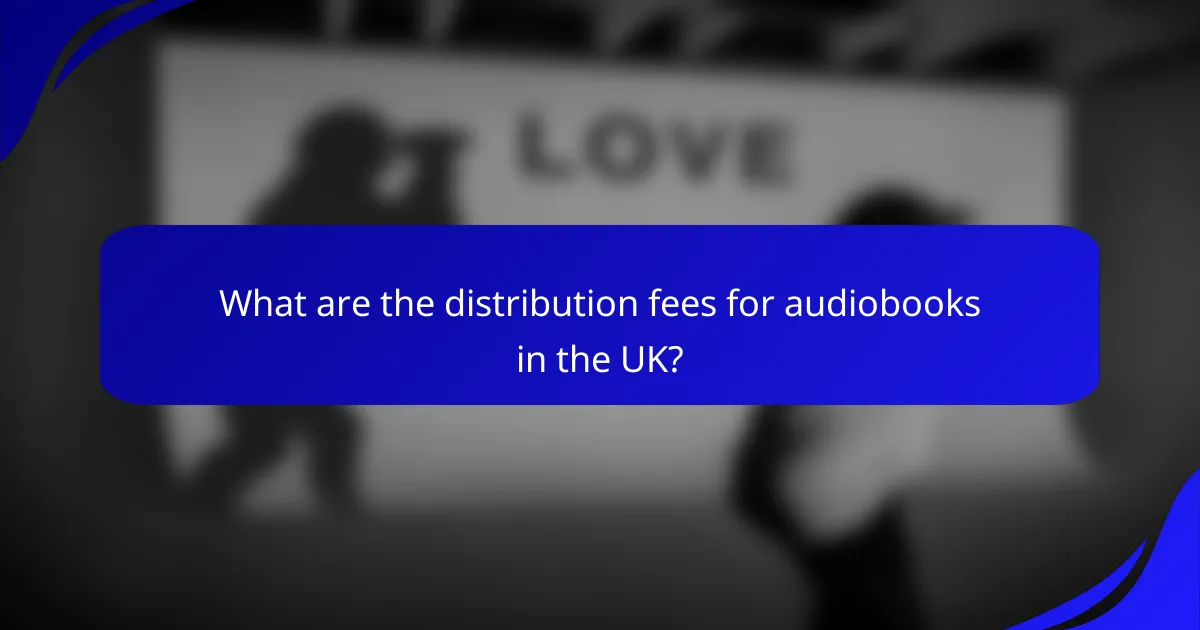
What are the distribution fees for audiobooks in the UK?
Distribution fees for audiobooks in the UK can vary significantly based on the platform used. Typically, these fees include a combination of platform fees, retailer commissions, and production costs, which can impact overall profitability for authors and publishers.
Platform fees for Audible
Audible, one of the leading platforms for audiobooks, charges a platform fee that is generally around 25% of the retail price for titles sold. This fee is deducted from the revenue before royalties are calculated, meaning authors should factor this into their pricing strategy.
Additionally, Audible offers two royalty structures: a standard rate of 40% for exclusive titles and a lower rate of 25% for non-exclusive titles. Authors must decide whether the benefits of exclusivity outweigh the potential for broader distribution.
Distribution costs for Findaway Voices
Findaway Voices operates on a different model, charging a flat fee for distribution services rather than a percentage of sales. This fee typically ranges from £15 to £50 per title, depending on the services selected, such as enhanced distribution to libraries and retailers.
Authors using Findaway Voices can keep a higher percentage of their royalties, as the platform allows for a more flexible pricing structure and broader reach across various retailers. This can be particularly advantageous for independent authors looking to maximize their earnings.
Retailer commission structures
Retailer commissions can vary widely across different platforms. For instance, major retailers like Apple Books and Google Play may take around 30% of the sale price, while smaller platforms might have lower commission rates.
It’s crucial for authors to research and compare these commission structures when choosing where to distribute their audiobooks. Understanding the fees involved can help in setting competitive prices and maximizing revenue potential.
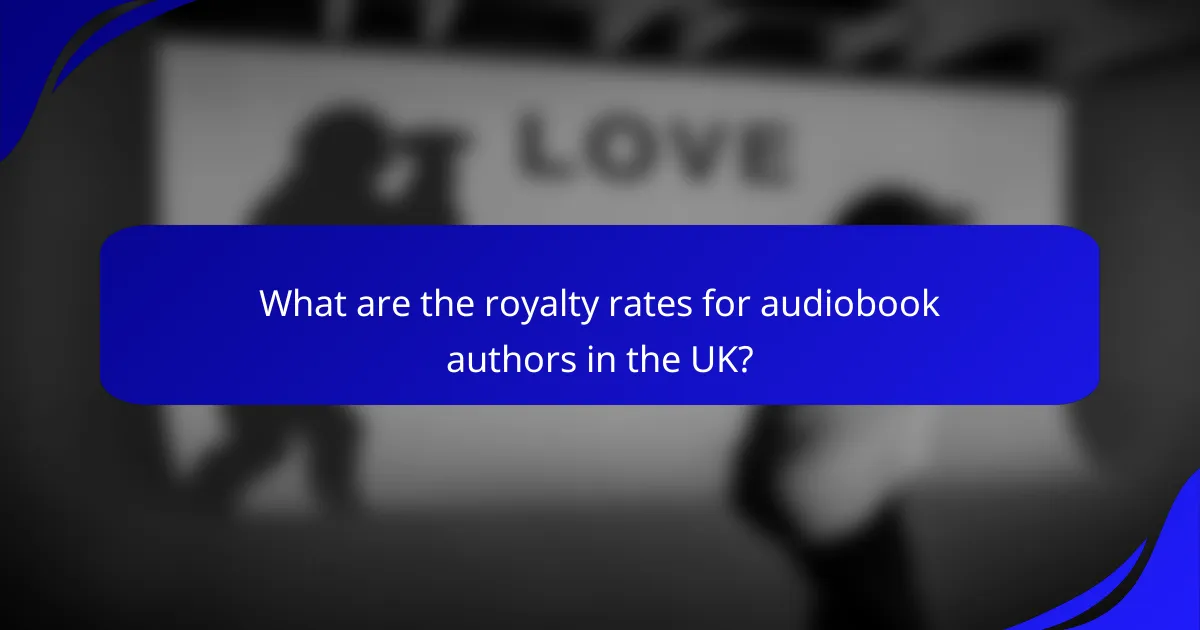
What are the royalty rates for audiobook authors in the UK?
In the UK, audiobook authors typically earn royalties ranging from 25% to 40% of the sales price, depending on the distribution method and agreements in place. Understanding these rates is crucial for authors to maximize their earnings from audiobook sales.
Standard royalty rates on Audible
Audible, one of the largest audiobook platforms, generally offers standard royalty rates of around 25% for authors who publish through its self-publishing service, ACX. If authors choose to distribute their audiobooks exclusively through Audible, they may earn a higher royalty rate of up to 40% on sales.
For example, if an audiobook is priced at £10, an author could earn between £2.50 and £4.00 per sale, depending on their distribution choice. This structure incentivizes authors to consider exclusive agreements for potentially higher returns.
Royalty structures for independent publishers
Independent publishers often have more flexibility in setting royalty rates for audiobooks. Many independent platforms allow authors to negotiate their rates, which can range from 30% to 50% of the sales price. This flexibility can be beneficial for authors with a strong marketing strategy or established audience.
Authors should carefully evaluate the terms offered by different independent publishers, as some may charge additional fees that could affect overall earnings. It’s advisable to read the fine print and understand the full financial implications before committing.
Negotiated rates with distributors
Negotiating rates with distributors can significantly impact an author’s earnings from audiobook sales. Authors can often negotiate higher royalty percentages based on their previous sales performance or the potential marketability of their work. Rates can vary widely, sometimes exceeding 50% for successful titles.
When negotiating, authors should consider factors such as distribution reach, marketing support, and any upfront costs. A well-negotiated agreement can lead to substantially higher income, making it worthwhile for authors to invest time in discussions with distributors.

What factors influence audiobook production costs?
Audiobook production costs are influenced by several key factors, including the length of the audiobook, the complexity of audio editing, and the choice of narrator. Understanding these elements can help authors and publishers budget effectively and make informed decisions during the production process.
Length of the audiobook
The length of the audiobook significantly impacts production costs, as longer recordings require more time for narration, editing, and mastering. Typically, production costs can range from a few hundred to several thousand dollars, depending on the total runtime. For example, a 10-hour audiobook may cost substantially more than a 3-hour one due to increased labor and resource demands.
When budgeting, consider that many production companies charge per finished hour, which can average between $200 to $500 or more. This pricing structure means that even small increases in length can lead to considerable cost increases.
Complexity of audio editing
The complexity of audio editing can also affect production costs. Simple recordings with minimal background noise and straightforward narration require less editing, while projects with multiple sound effects, music, or intricate editing will incur higher fees. For instance, a straightforward narration may cost less than $100 per hour of finished audio, whereas a highly produced audiobook could exceed $500 per hour.
When planning your audiobook, assess the level of editing required. Avoid common pitfalls like underestimating the need for sound quality improvements, as this can lead to increased costs later in the process.
Choice of narrator
The choice of narrator plays a crucial role in determining production costs. Professional narrators with established reputations may charge higher fees, often ranging from $200 to $1,000 per finished hour, depending on their experience and popularity. In contrast, less experienced narrators may offer more affordable rates but could impact the overall quality of the audiobook.
Consider the target audience and the genre of your audiobook when selecting a narrator. A well-chosen voice can enhance listener engagement and potentially increase sales, making it a worthwhile investment despite higher upfront costs.
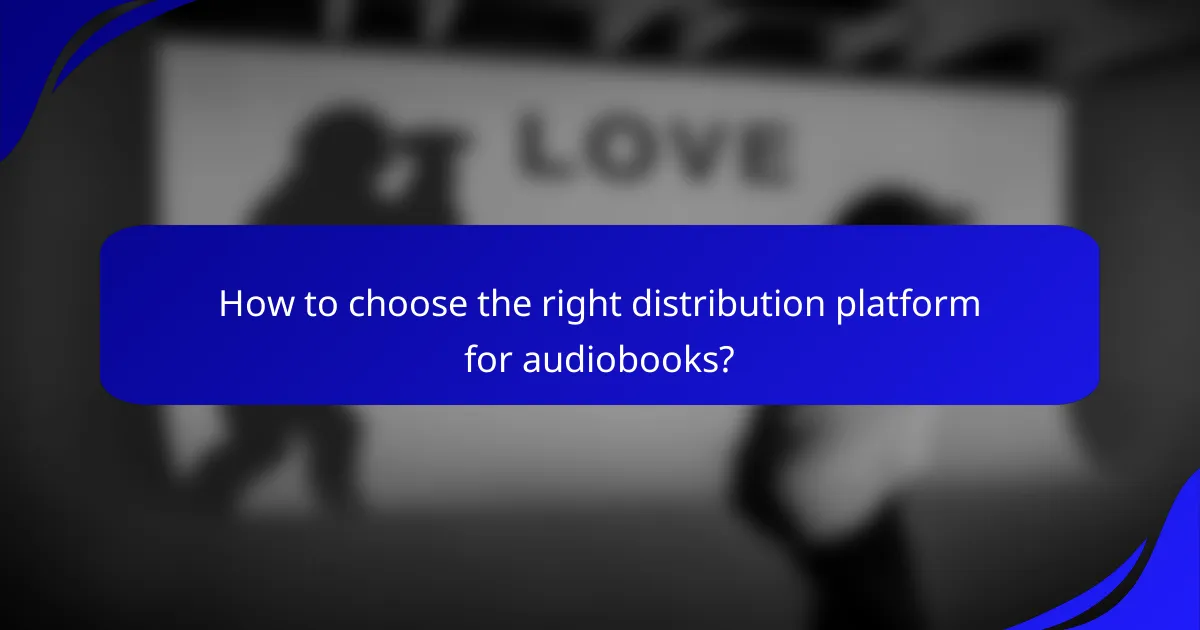
How to choose the right distribution platform for audiobooks?
Selecting the right distribution platform for audiobooks involves evaluating factors such as audience reach, royalty rates, and fees. Consider your target audience and how each platform aligns with your publishing goals to maximize your book’s visibility and profitability.
Comparing Audible and Google Play
Audible is a leading platform for audiobooks, offering a vast library and a subscription model that attracts millions of listeners. In contrast, Google Play provides a more flexible pay-per-download model, appealing to users who prefer to purchase audiobooks individually.
When comparing the two, consider that Audible typically offers higher visibility due to its established user base, while Google Play may allow for broader international reach. Each platform has its own royalty structure, which can significantly impact your earnings.
Evaluating Findaway Voices vs. ACX
Findaway Voices and ACX are two popular options for audiobook distribution. ACX, owned by Audible, allows authors to produce and distribute their audiobooks directly to Audible and iTunes, but it usually requires exclusivity, limiting your distribution options.
On the other hand, Findaway Voices offers a non-exclusive agreement, allowing you to distribute your audiobook to multiple platforms, including libraries. This flexibility can lead to a wider audience but may come with different royalty rates and fees that you should carefully assess.
Understanding audience reach and royalties
Audience reach varies significantly between platforms. For instance, Audible has a large, dedicated subscriber base, while platforms like Findaway Voices can distribute to libraries and international markets, potentially increasing your audiobook’s exposure.
Royalties also differ; typically, authors can expect around 25% to 40% of sales on platforms like ACX, while Findaway Voices offers around 60% of the retail price, depending on the distribution channels chosen. Understanding these financial aspects is crucial for maximizing your earnings from audiobook sales.
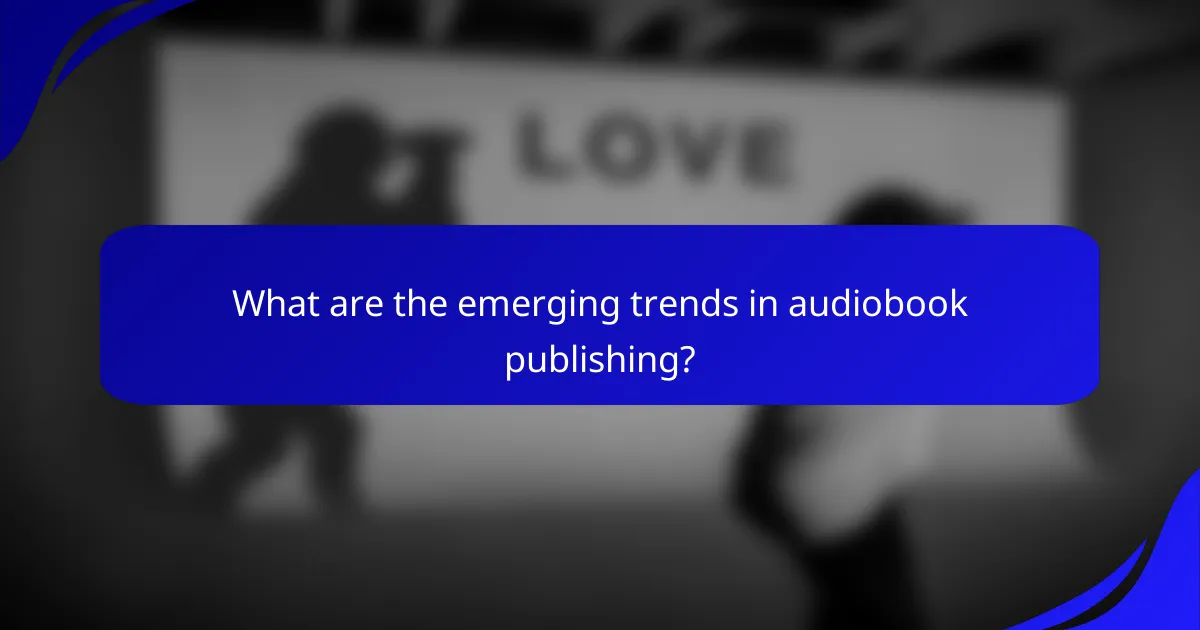
What are the emerging trends in audiobook publishing?
Emerging trends in audiobook publishing include the rise of AI narrators, increased accessibility, and the growing popularity of subscription services. These trends are reshaping how audiobooks are produced, distributed, and consumed, making the market more dynamic and competitive.
Growth of AI narrators
The growth of AI narrators is transforming audiobook production by providing a cost-effective alternative to human voice actors. AI technology can generate lifelike speech, allowing publishers to produce audiobooks quickly and at a lower cost, often in the low hundreds of USD per title.
While AI narrators can handle a variety of genres, they may lack the emotional depth and nuance that experienced narrators bring. Publishers should consider the target audience and genre when deciding whether to use AI or human narrators, as certain works may benefit from a more personal touch.
As AI technology continues to improve, it is essential for publishers to stay informed about advancements and evaluate the quality of AI-generated voices. Regularly testing different AI solutions can help determine the best fit for specific projects, balancing cost and quality effectively.
